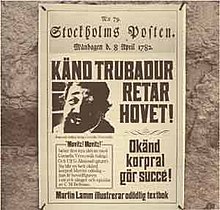| Movitz! Movitz! | ||||
|---|---|---|---|---|
 | ||||
| Studio album by | ||||
| Released | 1977 | |||
| Genre | Folk music Protest music Swedish folk music | |||
| Length | 36:14 | |||
| Label | Universal Records | |||
| Cornelis Vreeswijk chronology | ||||
| ||||
Movitz! Movitz! is a 1977 album by Cornelis Vreeswijk of his interpretations of the Stockholm troubadour, Carl Michael Bellman. [1]
